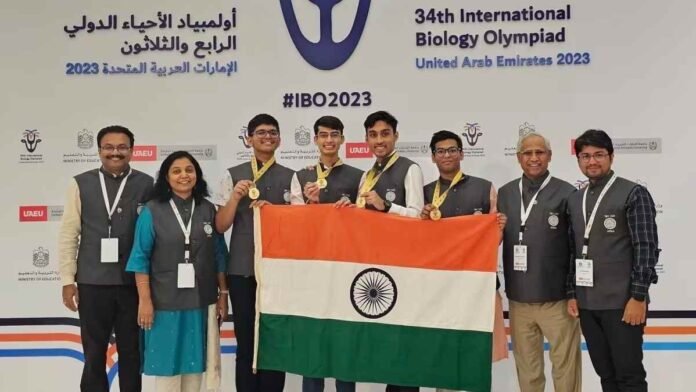India achieved a remarkable feat at the 34th International Biology Olympiad held in Al Ain, UAE, from July 3 to 11. It was the first time that India secured the top position in the medals tally, achieving an outstanding all-gold performance.
Team India consisted of four students who all won gold medals at the International Biology Olympiad 2023 (IBO) organized by the UAE. The event saw participation from 76 countries, as confirmed by a government statement.
The deserving recipients of the gold medals were Megh Chhabda from Jalna, Maharashtra; Ishan Pednekar from Kota, Rajasthan; Dhruv Advani from Bengaluru, Karnataka; and Rohit Panda from Risali, Chhattisgarh.
This achievement was widely celebrated, with Chandrasekhar expressing his congratulations through a tweet. He highlighted that this was the first time all four students representing Team India had won gold medals at the 34th International Biology Olympiad in Al Ain, UAE. The event attracted a total of 293 students from 76 countries.
India has previously excelled in other disciplines as well. The country had topped the medals tally multiple times in fields such as Astronomy and Astrophysics in 2021, Junior Science in 2021 and 2022, as well as Physics in 2018.
Singapore also emerged triumphant, securing four gold medals at the event. Overall, 29 gold medals were awarded to deserving participants.
Accompanying the Indian team were Professor Madan M Chaturvedi, former Senior Professor at Delhi University, Dr. Anupama Ronad from HBCSE, TIFR, and scientific observers Dr. VV Binoy from the National Institute of Advanced Studies, Bengaluru, and Dr. Rambhadur Subedi from NIRRH, Mumbai.
The International Biology Olympiad is recognized as the world’s premier biology competition for secondary school students. Its primary aim is to stimulate and nurture the talents of these students, fostering their future careers in the field of biology.
To qualify for the IBO, students must be among the top four performers in their respective National Biology Olympiads. During the competition, participants engage in both theoretical and practical exams. The theoretical exams involve completing 100 tasks in a close-ended format. The practical exams, conducted in 3-4 laboratories, require students to conduct investigations and analyze data.
One noteworthy aspect of the IBO is the absence of a prescribed syllabus or curriculum. This means that students cannot rely on pre-defined topics and must be well-rounded in their knowledge and understanding of biology.



